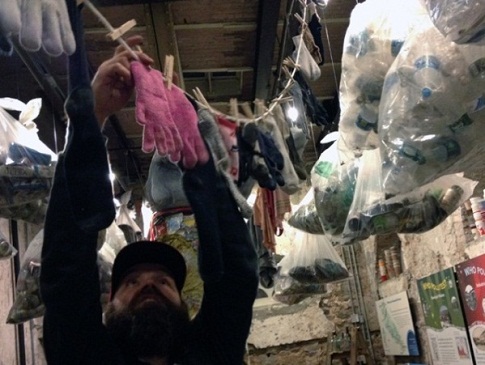
Artist Bradley Maule works on his "One Man's Trash" exhibit. Fairmount Water Works photo.
Anyone who’s taken the time to enjoy the many scenic opportunities afforded by Philly’s waterways has had that moment—you’re soaking in the green and sunshine, marveling at the natural beauty of a river or stream cutting through the urban landscape. And then, some ugly piece of litter breaks the mirage, reminding you that you are, indeed, still in a very big city. One with a trash problem.
Bradley Maule, a Pennsylvania native and Philly transplant, has had that moment more times than he cares to count. Like many nature lovers, he often had the impulse to pick up litter someone else carelessly dropped while hiking along one of his favorite haunts, the Wissahickon Creek in the city’s Northwest. His distaste for the pervasive trash, though, soon morphed into a sort of obsession. Out of this obsession was born “One Man’s Trash,” the latest exhibit at our Fairmount Water Works, which opens (quite appropriately) for today’s Earth Day festivities.
The first in a series of “Culture and Conversation” events that celebrate the Water Works’ 200th anniversary, “One Man’s Trash” is the culmination of a year’s worth of trash collected by Maule during weekly walks in Wissahickon Valley Park, an 1,800-acre wooded gem with the Wissahickon Creek at its heart. The Mt. Airy resident and artist laid out his plans for the project on his website, Philly Skyline, and described his yearlong effort for readers:
Each week, once a week, for all of 2014, I went on 2-3 hour hikes, picking up all the litter I encountered. If something was too big to haul out, I made a note of it on my phone’s text app and made arrangements to remove it with Philadelphia Parks and Recreation and Friends of the Wissahickon, the official partners on this project.
Luckily for us, Maule drew the line at picking up “organic litter”—a distinction that means we don’t have to look at a display of rotting apple cores or bags of dog waste!
The Water Works will unveil Maule’s work, which includes infographics reflecting his meticulous tally of collected litter, during a 5:30 p.m. opening reception. The exhibit will be on display through June 26, after which all the junk he’s collected will be recycled, donated and otherwise disposed of.
"A timely exhibit for Earth Day, ‘One Man's Trash’ brings to the forefront the amount of litter accrued on land, and provides an insightful look into how our behavior truly affects our water supply," says Karen Young, executive director of Fairmount Water Works.
When asked what he wants people to take away from the exhibit, Maule says he wants to inspire “…deeper consideration for the waste we each generate” and to foster awareness “that we need to treat our parks better.” In addition to compiling all the trash, he took time to look at the broader waste tied to a specific trail-side menace: the plastic water bottle.
"One of the most common objects I encountered over the course of the year was plastic water bottles—255 of them (with 43 brand names)," Maule told us. Maule also says his focus on the Wissahickon underscored a troubling connection between littering in parks and fouling up our waterways. "Almost all of Philly's big parks — Fairmount, Wissahickon, Pennypack, Cobbs, Tacony, Poquessing—exist where they do because of watersheds," notes Maule. "Unless it's picked up and properly disposed of, litter ultimately ends up in our waterways, whether directly in a place like the Wissahickon, or after a journey from city streets through gutters and sewers."
Click here to register for the “One Man’s Trash exhibit. The event is free, but space is limited.